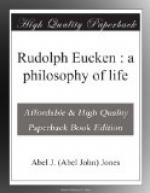The slight looseness in the use of terms, and a certain inexactness of expression that is sometimes apparent, must of course not be exaggerated; it is by no means serious enough to invalidate his main argument. It gives an opportunity for a great deal of superficial criticism on the part of unsympathetic writers, which, however, can do little harm to Eucken’s position. One has to remember that it is difficult to combine the fervour of a prophet with pedantic exactness, and that an inspired and profound philosopher cannot be expected to spend much time over verbal niceties.
Of course one would prefer absolute clarity and exactness, but we must guard against allowing the absence of these things to prejudice us against the profound truths of a philosophical position, which are not vitally affected by that absence.
Frequent criticism is directed towards the incompleteness of Eucken’s philosophy. He does not introduce his philosophy with a systematic discussion of the great epistemological and ontological problems. Philosophers have often introduced their work in this way, and it has been customary to expect an introduction of the kind. To do so, however, would be quite out of keeping with Eucken’s activistic position, as it would necessarily involve much intellectual speculation, and he does not believe that the problem of life can be solved by such speculation. It is unfortunate that he has so little to say concerning the world of matter. Beyond insisting upon the superiority of the spiritual life, which he calls the “substantial,” over matter, which he calls the merely “existential,” he tells us very little about the material world. Rightly or wrongly, thinkers are deeply interested in the merely existential, in the periphery of life, in the material world, but for the solution of this problem Eucken contributes little or nothing. His sole concern is the spiritual world, and although we should like an elaboration of his views on the mere periphery of life, we must not let the fact that he does not give it, lead us to undervalue his real contributions. Another serious incompleteness lies in the fact that he pays little attention to the psychological implications of his theories. Until he does this, his philosophy cannot be regarded as complete. Eucken, however, would be the last to claim that his solution is a finished or final one; he is content if his work is a substantial contribution to the final solution.
Objection has been taken to the fact that he starts upon his task with a definite bias in a certain direction. He candidly admits from the outset that his aim is to find a meaning for life, and in doing this he of course tacitly assumes that life has a deep and profound meaning. Strict scientists aver that the investigator must set out without prejudice, to examine the phenomena he observes; and Eucken’s initial bias may form a fatal stumbling-block to the acceptance of his philosophy by these, or indeed, by any who are not disposed to accept this fundamental position. If we deny that life has a meaning, then Eucken has little for us; but if we are merely doubtful on the matter, the reading of Eucken will probably bring conviction.




